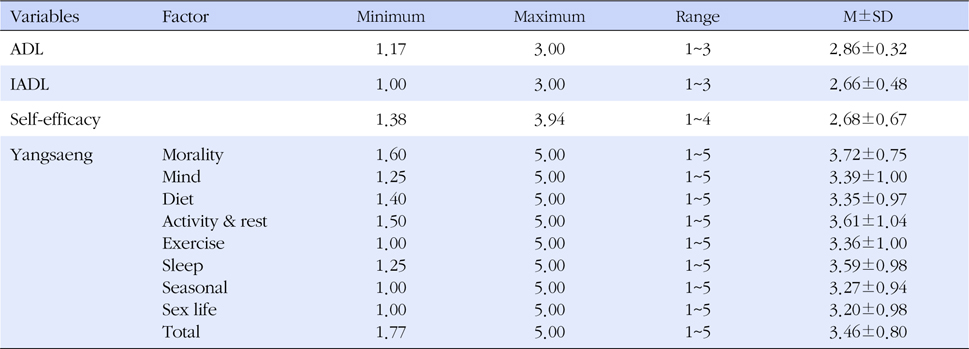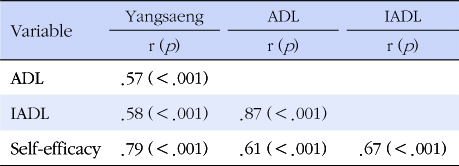Articles
- Page Path
- HOME > J Korean Acad Community Health Nurs > Volume 24(1); 2013 > Article
-
Original Article
- A Study on Daily Living Abilities, Self-efficacy and Yangsaeng Behavior in Elderly Men (Yangsaeng; traditional oriental health promotion)
- Oh-Gye Kwag, Yunhee Kwon
-
Journal of Korean Academy of Community Health Nursing 2013;24(1):11-19.
DOI: https://doi.org/10.12799/jkachn.2013.24.1.11
Published online: March 31, 2013
1Department of Nursing, Kyungwoon University, Gumi, Korea.
2Department of Nursing, Taegu Science University, Daegu, Korea.
• Received: August 28, 2012 • Accepted: February 28, 2013
© 2013 Korean Academy of Community Health Nursing
- 575 Views
- 1 Download
- 8 Crossref
Abstract
-
Purpose
- This study was carried out to investigate relations among daily livingabilities, self-efficacy, and Yangsaegn behavior, and influencing factors on Yangsaeng behavior among elderly men.
-
Methods
- Data were collected from 497 male elders in the D metropolitan city. Research tools included ADL, IADL, and the scale for self-efficacy and Yangsaeng behavior. The data were analyzed using frequency analysis, average and standard deviation, t-test, One-way ANOVA, Pearson's correlation coefficients, and multiple regression analysis with the SPSS/WIN 19.0 program.
-
Results
- The subjects' ADL score was 2.86, their IADL score of subjects 2.66 out of 3, and their self-efficacy score was 2.68 out of 4, and their Yangsaeng behavior score 3.46 out of 5. There were significant differences in Yangsaeng behavior among the subjects due to age, education level, monthly income, marital status, family structure, religion, health status, andperiodic health examination. There were significant positive correlations among ADL, IADL, self-efficacy, and Yangsaeng behavior. According to the research, influencing factors on Yangseng behavior in elderly men included self-efficacy, health status, ADL, education level, IADL, and family structure.
-
Conclusion
- Findings from this study can be used as basic data to develop Yangsaeng behavior programs for elderly men.
- 1. Cha NH. A study on Yangsaeng in Korean elders. J Korean Acad Community Health Nurs 2010;21(3):293–302.
- 2. Cheon EY. Effects of ADL, self-efficacy and social support on life satisfaction in elders with visual liss. J Korean Gerontol Nurs 2005;7(2):195–204.
- 3. Choi EK. Relationship between actual health and Yangseng of the elderly in urbanites 2004;Iksan: Wonkwang University; Unpublished master's thesis.
- 4. Jung HY, Park HS, Park SY. A study on Yangsaeng for health promotion of aged women in rural area. J Korean Acad Community Health Nurs 2009;20(1):49–58.
- 5. Jung YH. The life expectancy and health-adjusted life expectancy of Koreans. Health Welf Policy Forum 2012;193:5–18.
- 6. Katz S, Ford AB, Moskowitz W, Jackson BA, Jaffe MW. Studies of illness in the aged. The index of ADL: A standardized measure of biological and psychosocial function. JAMA 1963;185(12):914–919.
- 7. Kim AJ. Development of a tool in measuring Yangsaeng 2004;Seoul: Ewha Womans University; Unpublished doctoral dissertation.
- 8. Kim JN, Shin YS, Khang MS, Khang YS, Kho YA, Kwon YH, et al. Community Health Nursing 2011;Seoul: Soomoonsa Publishing.
- 9. Kim KS, Lee EJ. Relation between leisure sports' activities among older adults on activities of daily living andsuccessful aging. J Korea Contents Assoc 2009;10(4):424–432.
- 10. Kim MS. The effect of self efficacy and self esteem on the mental health of rural elderly. J Korean Acad Public Health Nurs 2007;21(2):146–157.
- 11. Kim SY. A study of factors influencing health promotion behavior in elderly people: Self efficacy, social support and depression. J Korean Gerontol Nurs 2003;5(2):171–181.
- 12. Lawton MP, Brody EM. Assessment of older people: Self-maintaining and instrumental activities of daily living. Gerontologist 1969;9(3):179–186.
- 13. Ministry of Health and Welfare. A national health nutrition survey 2009;Retrieved July 23, 2011. from http://www.mohw.go.kr/
- 14. Oh HS. Health promoting behaviors and quality of life of Korean women with arthritis. J Nurs Acad Soc 1993;23(4):617–630.
- 15. Park SY. A study on depression, ADl, IADL, and QOL among community-dwelling, low income elderly. J Korean Acad Public Health Nurs 2009;23(1):78–90.
- 16. Park YS, Seo DS, Kwon YH. Factors influencing Yangsaeng in elders. J Korean Acad Nurs 2011;41(1):72–79.
- 17. Pender NJ. Health promotion and nursing. Paper presented at The First International Conference of College of Nursing, Korea University, Seoul, Korea 1999;10.
- 18. Seo HM. Construction of health promoting behaviors model in elderly 2001;Seoul: Seoul National University; Unpublished doctoral dissertation.
- 19. Sherer M, Maddux JE. The self-efficacy scale: Construction & validity. Psychol Rep 1982;51:663–667.
- 20. Sohn SH. Differences in cognitive function and activities of daily living between two groups without depression among patients with senile dementia 1998;Seoul: Ewha Womans University; Unpublished master's thesis.
- 21. Statistic Korea. Korea social index 2011;Retrieved July 28, 2012. from http://kostat.go.kr/portal/korea/kor_nw/2/6/5/index.board
- 22. Sung JS, Park CS. Health promoting behavior and health status in the elderly. J Korean Gerontol Nurs 2005;7(1):71–78.
- 23. Walker SN, Sechrist KR, Pender NJ. The health-promoting life style profile: Development and psychometric characteristics. Nurs Res 1987;36(2):76–81.
- 24. Wang MJ. The relations among ADL, self-efficacy, physical activity and cognitive function in Korean elders. J Korean Acad Community Health Nurs 2010;21(1):101–109.
- 25. Wang MJ, Cha NH. The relations among daily life performance ability, physical activity and Yangsaeng in the elders. Poster presented at Korean Academy of Community Health Nursing, Kyung Hee University, Seoul 2010;06.
- 26. Yoo JH, Chu SK, Ban KO. The relationship between the psychosocial characteristics, family function, and activities of daily living in the elderly females. J Korean Acad Public Health Nurs 2009;23(1):40–49.
Figure & Data
References
Citations
Citations to this article as recorded by 

-
Dance for Liberation: A Case Study for Addressing
Han
through a Traditional Korean Dance-Based Psychotherapy Approach
Koh Woon Kim, Tomoyo Kawano
Women & Therapy.2024; : 1. CrossRef - A Conceptual Analysis of Korean Elders' Yangsaeng in Nursing
Min Kyung Gu
Journal of Korean Academy of Community Health Nursing.2019; 30(1): 1. CrossRef - Influence of Disease-related Knowledge, Depression, and Family Support on Health Behaviors in Older Patients with Coronary Artery Disease
Ji Mi Mun, So Young Shin
Journal of Korean Gerontological Nursing.2019; 21(3): 155. CrossRef - Predictors of Yangsaeng (Health Management) Among Korean Middle-Aged Adults
Min Kyung Gu, Sohyune R. Sok
Holistic Nursing Practice.2018; 32(4): 210. CrossRef - A Trend Analysis of the Journal of Korean Nursing Research related with Yangseng
Yunyoung Kim, Hye-Ju Park, Eunsu Jang
Journal of East-West Nursing Research.2016; 22(1): 10. CrossRef - Traditional Yangsaeng oriental health promotion in patients with cardiovascular disease
S. Shin, J.H. Kim, D. Jung
International Nursing Review.2015; 62(3): 312. CrossRef - Effect on Cognitive Function in Elderly People
Jeong-Sook Lee, Sun-Young Lee
The Korean Journal of Health Service Management.2015; 9(3): 201. CrossRef - Elder Abuse Perception and Caregiving Stress of the Adult Caregivers
Hee Kyoung Jang, Hye Young Kim
Journal of Korean Academy of Community Health Nursing.2013; 24(3): 358. CrossRef

 KACHN
KACHN





 PubReader
PubReader Cite
Cite

